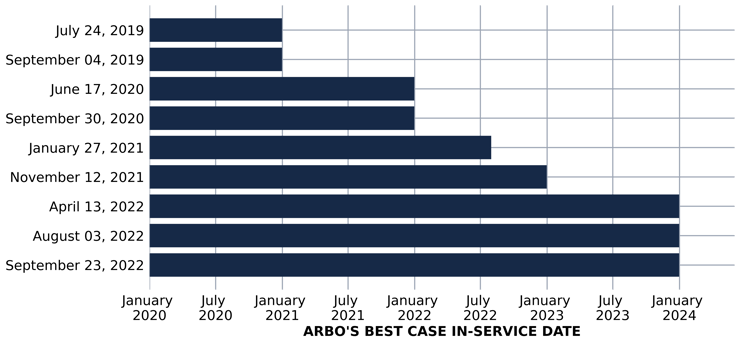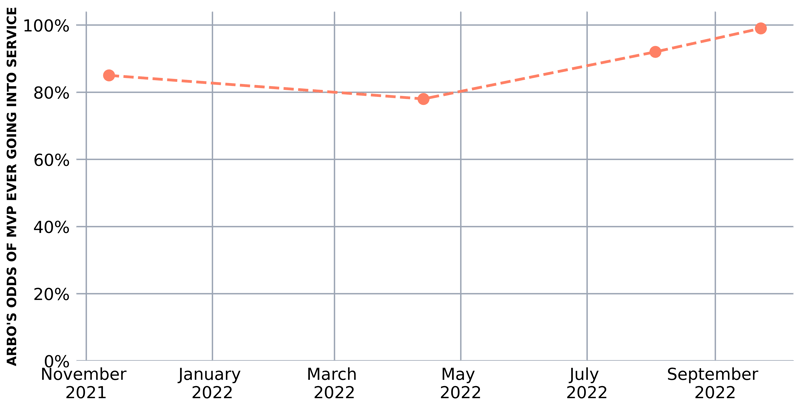Future of MVP May Be in Senator Manchin’s Hands
Originally published for customers November 02, 2022
What’s the issue?
We have been tracking the saga of Mountain Valley Pipeline (MVP) since July 2017, which was even before FERC issued its certificate. As early as May 2018, we were noting that MVP was experiencing trouble gaining approval for permits it received by a three-judge panel on the Fourth Circuit.
Why does it matter?
Late last month, that same three-judge panel of the Fourth Circuit held an oral argument about the water quality certificate that the state of West Virginia had issued for the project. The questioning by the judges has led us to the firm belief that there is simply no way that MVP will be able to sustain all of the permits it needs to complete construction as long as those permits must be approved by that Fourth Circuit panel.
What’s our view?
Senator Manchin has proposed a permitting reform measure that would remove jurisdiction over MVP’s permits from the Fourth Circuit and move them to the DC Circuit. If Senator Manchin is unable to get that legislation passed, we believe that the odds of MVP ever going into service drop to almost zero.
We have tracked the saga of Mountain Valley Pipeline (MVP) since July 2017, which was even before FERC issued its certificate. As early as May 2018, we noted that MVP was experiencing trouble gaining approval for permits it received by a three-judge panel in the U.S. Court of Appeals for the Fourth Circuit (Fourth Circuit). Late last month, that same three-judge panel of the Fourth Circuit held an oral argument about the water quality certificate (WQC) that the state of West Virginia had issued for the project. The questioning by the judges has led us to the firm belief that there is simply no way that MVP will be able to sustain all of the permits it needs to complete construction as long as those permits must be approved by that panel of Fourth Circuit judges.
Senator Manchin has proposed a permitting reform measure that would remove jurisdiction over MVP’s permits from the Fourth Circuit and move them to the DC Circuit. If Senator Manchin is unable to get that legislation passed, we believe that the odds of MVP ever going into service drop to almost zero.
The Saga of MVP in Prior Headlines
We began writing about MVP in July 2017 in Emerging Risk Factors for Mountain Valley and Atlantic Coast Projects. Even then, we noted that the state of Virginia Department of Environmental Quality (VADEQ) seemed “to be feeling its way through the dark with regard to its regulatory oversight” of the project and that its lack of an approval process could “lengthen the timeline for required state-level approvals and lead to follow-on litigation by environmental opposition groups that seek to challenge the VADEQ's ad-hoc process.” Little did we know then how right we would be. While West Virginia’s WQC was the subject of last month’s oral argument before the Fourth Circuit, the oral argument about Virginia’s WQC has yet to be scheduled, but it is expected to be held early next year.

As the headlines from our prior articles show, the saga of MVP has been a long one. We will only touch on a few key notes from the above.
In 2018’s Litigation Tactics Receive Some Court Support in Appeals Involving MVP and ACP, we noted a new tactic by opposition groups was to challenge not only a project’s FERC certificate, but also to appeal “every federal permit required for a project.” We noted there that this strategy appeared to be gaining traction in the Fourth Circuit. In August of 2018, we reported that the “same three-judge panel that issued a stay against MVP with regard to the US Army Corps of Engineers' use of Nationwide Permit 12 within West Virginia had vacated and remanded two federal agency decisions made by the Bureau of Land Management (BLM) and the US Forest Service.”
In April 2019, we began to note that the future of the project seemed to run through the Fourth Circuit and that the court appeared to be very willing “to reverse administrative decisions and issue stays.” We initially attributed the low bar for the court’s willingness to intervene to the low standards of the Trump administration in reviewing and approving the required permits. In September 2020, we warned that the “ultimate fate of the project also probably lies with the Fourth Circuit, which is why a change in administrations following the November election may be MVP’s best hope. We believe the skepticism of the Fourth Circuit will recede if these permits are issued by a Democratic administration.” We were wrong.
Judges: Hand in Your Robes
Following the change in administrations, we noted in November 2021 that because the Biden administration had vigorously defended the Trump administration’s issuance of two key permits, authority to cross the Jefferson National Forest and the Biological Opinion and Incidental Take Statement (BO/ITS), we expected the Fourth Circuit to uphold both. In particular, the Biden administration argued to the court that the BO/ITS was reviewed and approved by career civil servants and deserved the deference due to such experts. The panel of three, alleged, judges however dispensed with such deference based on a pretextual analysis of a clerk’s search for the words “climate change” in the BO/ITS and determined that they knew better than the experts and voided both permits.
Then just last month, we were able to hear an oral argument before these same judges, Judges Thackery, Gregory and Wynn, in which the state of West Virginia was forced to defend its career civil servants’ decision to issue a WQC for the project. The dismissive tone of both Roger Gregory and Stephanie Thacker made it clear that they intend to substitute their judgment, based on a 30-minute oral argument, over the views of West Virginia’s experts who worked on the WQC for months. It seems clear that this panel no longer is acting as judges, but rather has decided it needs to kill this project no matter what the other branches of government decide.
MVP has already tried to get this panel replaced for future appeals and that request has been denied. Two of the judges, Wynn and Gregory, are approaching the age of 70, when many judges decide to go on senior status, which is a form of semi-retirement. But there are currently three judges on the Fourth Circuit that are much older than 70 and still actively serving. In addition, even if they chose to take senior status, they can continue to sit on panels and it is unclear whether either of them would want to give up on serving on this particular panel. Stephanie Thacker is only 57 and so will be around for a long time.
MVP Is at a Crossroads
Over time, we have typically been more skeptical than the project’s sponsors on the chances that MVP will be able to go into service in a reasonable time frame.
Beginning in 2019, we offered our views on the earliest in-service date for the project and at almost all times, it has been more than a year into the future.

Starting about a year ago, we began offering our views about not only the date on which the project might go into service, but also its overall chances of ever going into service.

As seen above, prior to last month’s oral argument, we still believed that, even without Senator Manchin’s help, the project had a significant chance of eventually going into service. Those odds grew during the last two estimates based primarily on the assumed passage of Senator Manchin’s proposed permitting reform language. However, following last month’s oral argument, we have become far less optimistic and believe that the project is at a crossroads that will decide its fate.
As we wrote in Manchin Reveals Permitting Reform Act – Help May Be on the Way for MVP, we believe that if Senator Manchin can pass into law the provisions from his permitting reform bill that specifically address MVP, then the project will almost certainly go into service and likely could do so within a year of that bill passing. However, we now do not see any future path for the project without such a bill. Simply speaking, we do not believe the current three-judge panel of the Fourth Circuit that is reviewing all of the required associated permits for the project will ever approve all of them and we also do not see a realistic way for MVP, other than through Senator Manchin’s legislation, getting relief from that panel’s continuing control over the project.